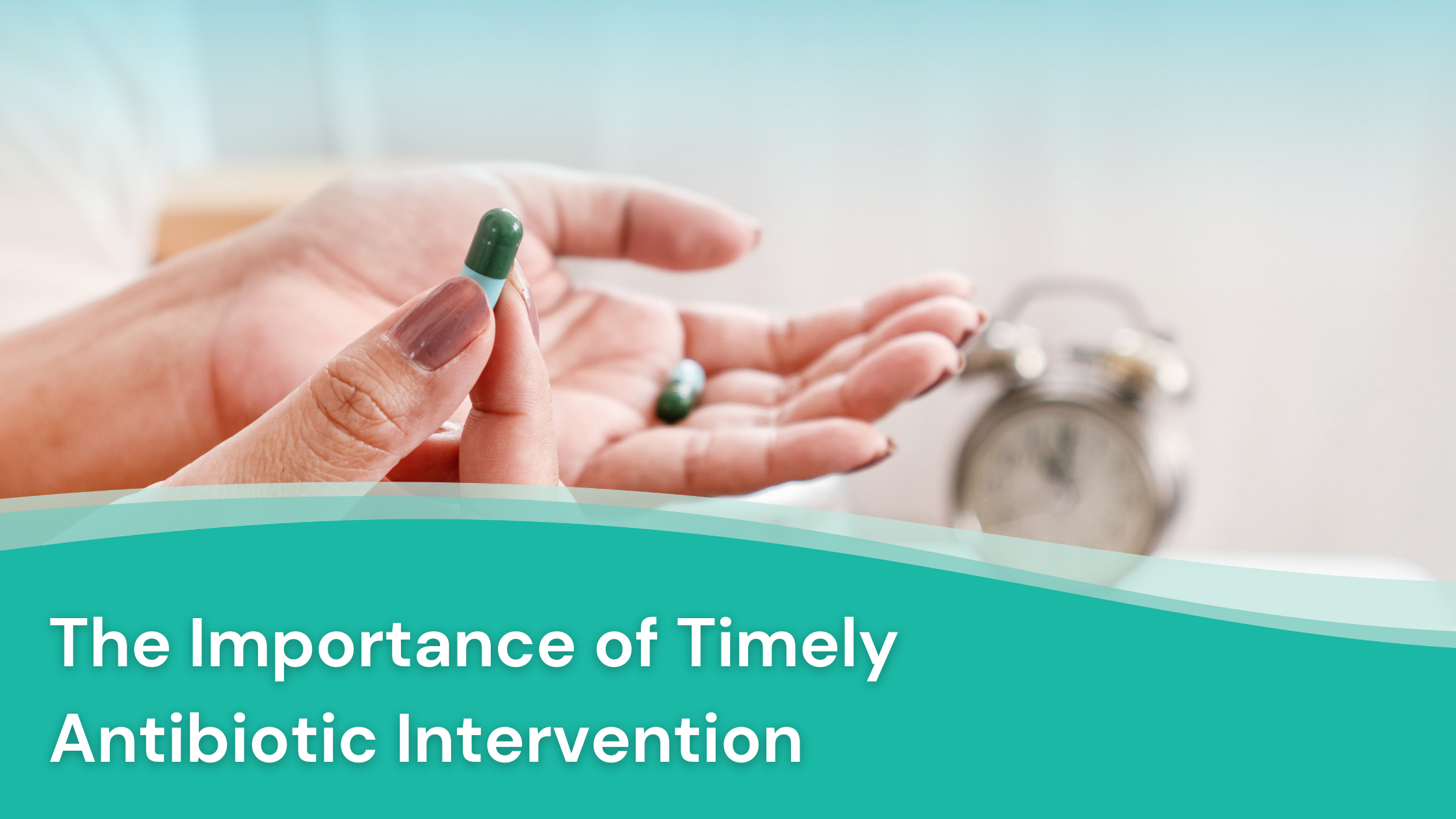When Disaster Strikes, It’s Not Hunger or Thirst That Takes the First Lives In every disaster zone, from hurricanes in the Caribbean to war zones in Ukraine, the pattern is the same. People worry about food and water, but it’s infection that kills first. A small wound...
The Importance of Timely Antibiotic Intervention

Accelerate healing through early treatment.
.

The Key to Effective Infection Management: Early antibiotic intervention and at the right dose.
While aggressive antibiotic treatment with high dosages has been the go-to methodology of treatment historically, research by the National Institute of Health is challenging that assumption. This article published by the NIH states that the timing of antibiotics being administered, relative to the dosages, also plays a critical role in the duration of an infection.
Antibiotics are a cornerstone of modern medicine, a powerful tool in our fight against bacterial infections. But when it comes to their effectiveness, timing is everything – almost. Administering appropriate dose of antibiotics promptly can significantly improve a patient’s outcome, while delays can have serious consequences.
The Power of Precise Timing and Dosing:
Boosting Survival Rates: Studies consistently show a strong link between delays in antibiotic treatment and higher mortality rates, particularly in life-threatening infections like sepsis. Each hour of delay can significantly decrease a patient’s chances of survival. Early antibiotics give the body a fighting chance to overcome the infection before it becomes overwhelming.
Targeting the Enemy Effectively: Antibiotics work best when bacteria are actively multiplying. Early administration at the correct dosage targets them during this vulnerable stage, stopping their spread and allowing the immune system to clear them more effectively. An incorrect dose, whether too low or too high, can allow the bacteria to survive and potentially develop resistance to the antibiotics, making treatment more challenging.
Protecting Vital Organs: Severe infections can cause significant damage to organs like the lungs, kidneys, and heart. Prompt antibiotic treatment at the recommended dose helps control the infection and minimize this damage, leading to a better overall outcome for the patient. Early intervention and proper dosing can prevent complications and the need for additional, potentially more intensive treatments.
The Dangers of Delay and Incorrect Dosage:
A Race Against Time and Strength: Delays in antibiotic treatment or taking incorrect dosages can significantly worsen a patient’s prognosis. The longer the bacteria have to multiply and potentially develop resistance, the harder it is to eradicate the infection.
Breeding Resistance: Incorrect doses, particularly under-dosing, create an environment where some bacteria can survive and potentially develop resistance to the antibiotic. This can have serious consequences for future treatment of that particular infection, not just for the individual patient but also for the wider community.
Increased Healthcare Costs: Complications arising from delayed or incorrect antibiotic use can lead to additional procedures, hospital stays, and other interventions, significantly increasing healthcare costs.
A Longer Road to Recovery: Delayed treatment or incorrect antibiotic dosages extend the infection’s course, leading to a longer recovery time with ongoing discomfort and disability for the patient.
Continue to Take the Full Regimen of Antibiotics:
It’s essential to complete the full course of antibiotics, even if symptoms begin to improve. This ensures all bacteria are eliminated, preventing relapse and the development of antibiotic resistance. Whenever taking medications, adhere strictly to your physician’s instructions.
Antibiotic resistance can occur when the infection is only partially treated. It is crucial to continue taking the entire regimen of antibiotics according to the instructions, even if you begin to feel better. If the infection has been allowed to become antibiotic-resistant from not taking the full schedule of antibiotics, the worsened illness can lead to serious complications.
Ensuring Access to Antibiotics
Administering antibiotics quickly is a prudent theory, but sometimes not a practical reality. CBS News recently reported on the widening gaps of mortality rates between city and rural residents due to difficult access to healthcare in rural communities. A local PBS Station in Washington said that rural patients often have to travel several hours from home to seek medical attention, which can lead to far worse patient outcomes. The difficulty in accessing treatment while on a trip can be so burdensome that the CDC has entire page devoted to getting healthcare while traveling.
Considering the timely need to administer antibiotics and the sometimes prolonged access to healthcare, the only way to ensure that you don’t fall in the gap is by having your own emergency antibiotics on hand at home. This is why we made the Jase Case – to give you access to treatment when healthcare is inaccessible.
Antibiotics are the preferred treatment for bacterial infections, but do not help treat viral infections like the Avian Influenza (Bird Flu) – which has seen a recent resurgence and is now infecting humans (CDC). Anti-viral drugs such as Oseltamivir (TamiFlu) are necessary for Influenza strains including Bird Flu. Oseltamivir 75mg (10 pack) is just one of the many available add-on medications we offer to add to your Jase Case to increase its usable scenarios.
Lifesaving Medications
Recent Posts
Keeping you informed and safe.
Medical Readiness: What Really Kills First
Exploring Dr. William Makis’ Hybrid Orthomolecular Cancer Protocol: Focus on Ivermectin and Mebendazole/Fenbendazole
Exploring Dr. William Makis’ Hybrid Orthomolecular Cancer Protocol: Focus on Ivermectin and Mebendazole/Fenbendazole *Disclaimer: This article is for educational purposes and does not constitute medical advice. Always seek professional guidance.* In the evolving...
Be Prepared for Life’s Unexpected Moments
3 Reasons EVERYONE should have emergency medications avaiable. It's all about access—access to medications and care when you need it most. And when things happen outside of your control that access can disappear.Below are 3 examples of how easily this access can be...
Youth Preparedness: Teaching, Building, and Coping with Disasters
Educating and preparing your children ahead of time means fewer surprises in the event of an emergency.Growing Up Prepared: Empowering Youth in Disaster Preparedness As we observe National Preparedness Month, it's crucial to remember that disasters can strike at any...




